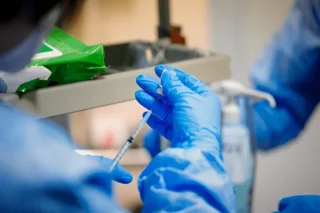Genetic screening before pregnancy helps identify risks early. Learn why expert Infertility Specialist recommend it for healthy parenthood.
The Importance of Planning Ahead
Starting a family is an exciting milestone, but it also comes with a responsibility to ensure your future child’s health. Many parents-to-be focus on lifestyle changes, such as diet and exercise, but overlook one crucial step: understanding their genetic health.
Genetic screening is increasingly becoming a vital part of pre-pregnancy care. By identifying potential hereditary conditions, couples can make informed choices and reduce risks for their baby.
This article explains why experts emphasize genetic screening before conception and how it contributes to safer, healthier pregnancies.

What is Genetic Screening?
Genetic screening is a test that examines your DNA to detect changes or mutations that could lead to inherited disorders. Unlike diagnostic tests, it does not confirm a condition but assesses your risk of passing certain genetic traits to your child.
These tests can detect carrier status for conditions such as:
-
Cystic fibrosis
-
Sickle cell anemia
-
Thalassemia
-
Tay-Sachs disease
With this information, couples can explore options and plan for a pregnancy with greater confidence.
Why is Genetic Screening Important Before Pregnancy?
Pre-pregnancy genetic screening offers several advantages:
Early Risk Identification
-
Detects whether you or your partner are carriers of genetic disorders.
-
Helps avoid unexpected complications during pregnancy.
Informed Decision-Making
-
Allows couples to discuss reproductive options, such as IVF with preimplantation genetic testing (PGT).
-
Provides time to consult specialists for tailored advice.
Emotional Preparation
-
Reduces anxiety by clarifying risks beforehand.
-
Gives couples peace of mind knowing they’ve taken preventive steps.
When Should Couples Consider Genetic Screening?
It is particularly recommended if:
-
There’s a family history of genetic disorders.
-
The couple belongs to an ethnic group with higher carrier rates for certain conditions.
-
They’ve experienced multiple miscarriages or infertility.
-
The mother is over 35 years of age, increasing the chance of chromosomal issues.
Even in the absence of these factors, many fertility experts suggest screening as part of routine preconception care.
Common Types of Genetic Screening Tests
Different tests can assess various risks:
-
Carrier Screening
Identifies if parents carry mutations that could be passed on. -
Chromosomal Screening
Checks for chromosomal abnormalities that may affect pregnancy outcomes. -
Expanded Panels
Tests for hundreds of conditions, even rare ones.
Your healthcare provider will recommend the most suitable option based on your medical and family history.
The Role of Experts in Genetic Screening
Consulting with a specialist ensures that results are interpreted correctly and appropriate next steps are taken. Professionals like the Best Infertility Specialist in Bhubaneswar guide couples through:
-
Understanding test results and implications.
-
Considering assisted reproductive technologies if necessary.
-
Emotional counseling to support decision-making.
Benefits of Genetic Screening Before Pregnancy
- Reduces risk of passing hereditary disorders
- Helps doctors create customized prenatal care plans
- Empowers couples with knowledge and options
- Supports early interventions if needed
Myths and Facts About Genetic Screening
❌ Myth: Only couples with a family history need genetic screening.
✅ Fact: Many carriers of genetic disorders have no known family history.
❌ Myth: Genetic screening is invasive and risky.
✅ Fact: Most pre-pregnancy tests involve only a simple blood or saliva sample.
❌ Myth: If results show carrier status, pregnancy isn’t possible.
✅ Fact: Carrier status doesn’t mean the child will inherit the disorder; there are many reproductive options available.
FAQs About Genetic Screening
Q1: Is genetic screening mandatory before pregnancy?
No, it’s optional but highly recommended to ensure informed decisions and reduce potential risks.
Q2: How long does it take to get results?
Most results are available within 2–3 weeks, depending on the test type.
Q3: Can genetic screening detect all birth defects?
No. It screens for specific hereditary conditions but doesn’t detect all possible pregnancy complications.
Q4: Is it expensive?
Costs vary depending on the panel chosen. Some clinics offer affordable options for routine pre-pregnancy screening.
Q5: Should both partners undergo testing?
Yes, testing both partners provides a complete picture of potential risks.
When to Seek Professional Advice
If you’re considering starting or expanding your family, consulting a reproductive health expert is an essential first step. They can assess your unique situation and recommend whether genetic screening is right for you.
Working with experienced professionals ensures that any concerns are addressed early, giving you and your partner confidence in your journey to parenthood.
Building a Healthier Future for Your Family
Genetic screening before pregnancy is not about creating fear—it’s about empowering couples with the knowledge to make the best choices for their future children.
By understanding potential risks early, you can work with healthcare experts to take proactive measures and reduce uncertainty. Specialists are dedicated to guiding couples through this process with compassion and expertise.
Taking this step today can make all the difference in ensuring a smoother, healthier path to parenthood.










